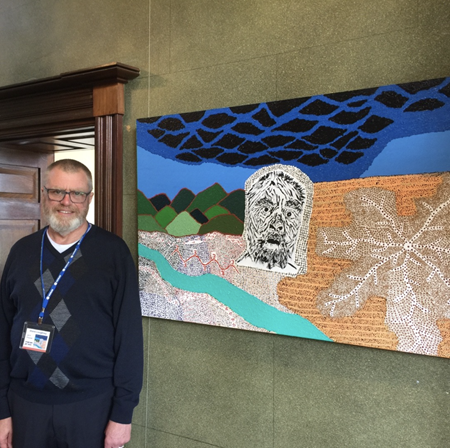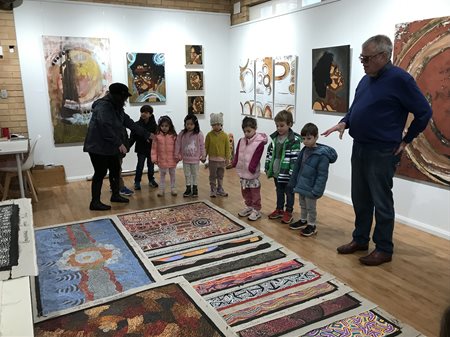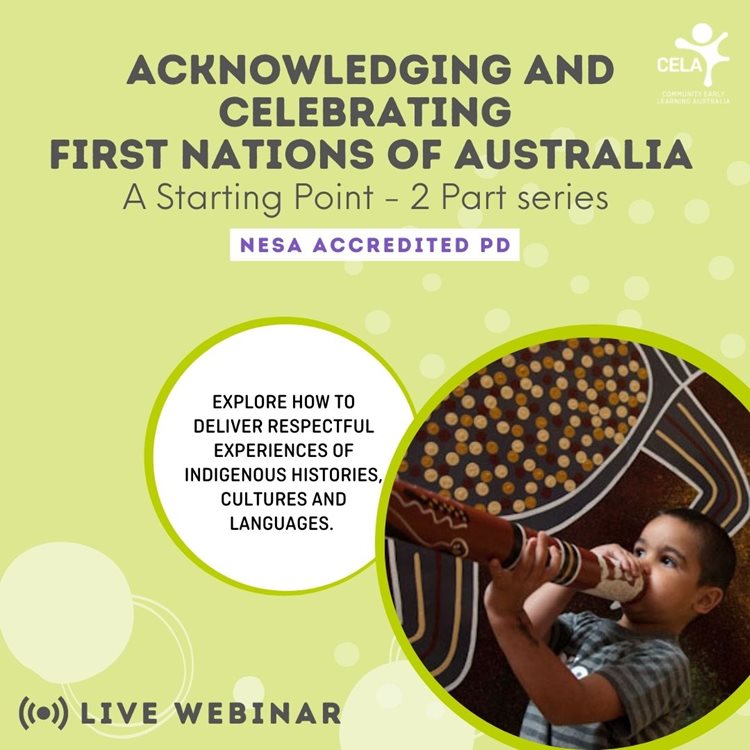The seeds of our connection with Glenn were sown when Julie, my co-educator, told me about some beautiful Aboriginal paintings she has been admiring at a local café. She asked the owner who the artist was, and they said it was painted by a local artist named Glenn. That was all the information we had.
At the same time, I was researching about a local Aboriginal heritage site located just 700m from our centre called The Wominjeka (Reconciliation) Garden located in St Oswald Anglican Church. As I researched more about the church, I came across the name Reverend Glenn Loughrey and how he is a Wiradjuri Artist. Julie and I matched the paintings we saw on his website with the ones at the café, and realised we had managed to locate the artist! It was pure coincidence and serendipity, so we decided to contact him.

Image via @glennloughrey on Instagram
Before I emailed Glenn, I took the time to learn more about him, refine my intentions as to what am I actually seeking and to curate a respectful message. Glenn was proactive via email and agreed to meet us for a visit during Term 2 at The Wominjeka (Reconciliation) Garden.
Term 2 - Our first visit with Glenn
During our first meeting, we sat at the meeting circle in the Wominjeka Garden and Glenn shared some of his cultural artefacts as a Wiradjuri Aboriginal Man. He showed us tapping sticks, a calamoon (traditional shopping basket or bassinet) and an emu caller. We toured the Wominjeka Garden and learnt about the different native plants present all around the garden.
Glenn explained to us the interesting repetitive circular shape of the garden to represent the significance of yarning circles as part of the Aboriginal culture. He also gave us a tour of the local gallery inside the church called Murnong Gallery, where he displays some of his paintings. As an artist, Glenn heavily emphasised that he gets his inspirations from the Land, referred to by Aboriginal people as Country. I understood that Country provides inspiration and knowledge in a similar way to books, and that his connection with Country runs deep.
Glenn also came to visit the 3-year-old Kindergarten children at Highgate ELC before Term 2 finished to talk about yarning circles and yarning sticks. We started to see the development of a great connection.
_1.jpg)
Images via St Oswald Anglican Church, Glen Iris, VIC
Term 3 - Learning about the cultural value of smoke and fire
In our 4-year-old Kindergarten, we have a Fire Lab program, and I thought that we could use the fire pit at the Wominjeka Garden as an extension. We reached out to Glenn to see if he could assist us with the fire pit, and he said yes. At our Fire Lab lessons, we learn about the danger of smoke, but Glenn explained how in his culture, smoke has the ability to cleanse things. We watched Glenn light up the fire and listened to his stories and anecdotes. There is something fascinating and alluring in watching fire.
Next, we arranged a follow-up visit to use the fire pit to cook something, because we have been cooking corn kernels during our Fire Lab program. Glenn suggested cooking Johnny Cakes or Bush Scones, and it was such a rich bonding experience for the children, educators, and Glenn.
These experiences translated back to our children’s play as I watched how their imaginative play would surround the theme of fire such as “cooking the fish in the fire” by using a tire to mark the bonfire.
Term 4 - Exploring Aboriginal art
For our last visit of the year, Glenn invited us to do some dot painting with him. Dot painting is Glenn’s preferred method of painting, for which he utilises the ends of skewers. He took us back to Murnong Gallery and explained to us the process behind his painting process and how it can take home over 100 hours to complete a single painting. Some children were excited to come back to see the gallery as they have visited the gallery in the past with their families. Glenn and I reflected back on the year and I thanked him on his continual effort to make time for us, and share his knowledge with us.
In a similar fashion, this also translated into children’s artworks as I noticed how some children started and wanting to do dots and points at the easel, moving from brush strokes to brush dots.

The importance and value of building respect for our local Aboriginal culture
Creating a relationship with our local Aboriginal and/or Torres Strait Islander community is an important factor in building children’s awareness and understanding of Aboriginal and Torres Strait Islander culture and perspective in an authentic manner. It also sends a strong message to the children, families, and educators of how much our Kinder respects and values Aboriginal and Torres Strait Islander culture.
For educators, this connection provides a way to learn how to embed local Aboriginal and Torres Strait Islander culture into our program in a culturally sensitive manner.
Building a partnership with Glenn requires reciprocity, time, and collaboration, and it has been an absolute delight to build this relationship. Here are some key aspects our team considered throughout our journey (QCAA, 2018):
- Understanding the local history: Taking the time to learn more about local Aboriginal history in our City of Boroondara has been invaluable. We have loved being able to ask questions of Glenn and connect the pieces of information to understand the bigger picture, then share new insights together as a team. Educators are also highly encouraged to learn and recognise the continuing impact of the history and legacies of Aboriginal and Torres Strait Islander communities in today’s world (ACECQA, 2020).
- Linkages to your Kindergarten Program: It is imperative to establish linkages of the opportunity that our visits to Glenn presents with what our current program already offers to create an even richer and more meaningful learning experience. At Highgate’s 4-year-old Kindergarten program, we run a weekly Bush Kinder and Fire Lab program that enables children to go on frequent outings, have first-hand experience with nature and be involved in risky play. This turned out to be a great basis for the topics we explored with Glenn and the 4-year-old Kindergarten children as they shared lots of similarities and room for extensions and provocations.
- Making the effort: It takes regular initiatives and respectful communication to build a strong partnership. I would always follow up and schedule future visits with Glenn and send him a thank you email for his time and preparations. I made the effort to share with Glenn any relevant learning stories about our visit or the related extensions we do at Kinder, and ask Glenn and his team if there is anything our Kinder can help with. Any ideas that Glenn proposed, I would take note and try to implement and report back to him on how the children found it. The little things we do shows a great deal of the sense of respect and appreciation we have for the other party. It is important to be mindful of how as educators we utilise this authentic connection.
- It takes time: Building a partnership is a two-way street and it takes time to build trust (ACECQA, 2020). Throughout the year, Glenn and our Kinder have become familiar with each other's working styles and pattern of ideas. We have to be mindful of each other’s schedule, workload and priorities in creating times to visit each other. The 4-year-old children in my room have also referred to Glenn often, as he becomes a regular and important provider of education in our tight-knit community.
Reference List:
ACECQA. (2020). Promoting, exploring and celebrating Aboriginal and Torres Strait Islander Cultures – ESA Training EYLF Factsheet 1. Retrieved from: https://www.acecqa.gov.au/sites/default/files/2020-12/Outcome1-ChildrenHaveAStrongSenseOfIdentity-SNAICC.pdf
QCAA. (2018). Building relationships with local communities. Queensland Curriculum & Assessment Authority. Retrieved from: https://www.qcaa.qld.edu.au/about/k-12-policies/aboriginal-torres-strait-islander-perspectives/protocols/building-relationships-local-communities
Professional development relating to this topic:

BOOK NOW
About Darren
Darren Halim is an early childhood teacher with strong interest and experience in bush kinder programs, inclusion support and empowering educators to drive positive change. Darren has worked in a variety of roles from educator to educational leader and director. He is also part of the Academics Teaching Team at The University of Melbourne, teaching organisational behaviour subjects. Currently, Darren is teaching at Highgate Early Learning Centre as the 4-year-old kindergarten teacher.